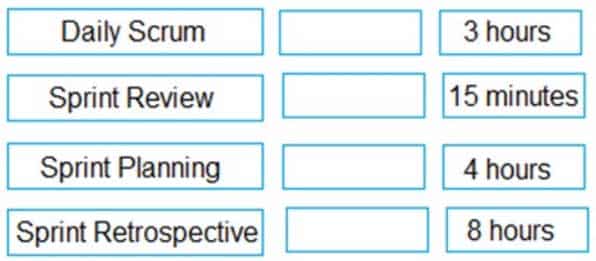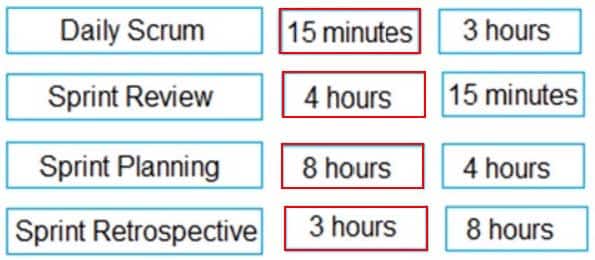PMI-ACP : PMI Agile Certified Practitioner : Part 18
-
Which one is NOT a reason to perform a Spike?
- To perform basic research to familiarize the team with a new technology or domain
- To analyze the expected behavior of a large story so the team can split the story into estimable pieces.
- To defer a story until a later Sprint while still showing progress to the Product Owner
- To do some prototyping to gain confidence in a technological approach
-
Which artifact is useful for seeing total project risk increasing or decreasing over time?
- Burndown bar chart
- Risk Burn-Up chart
- Risk Burndown Graph
- Risk Map
-
On a risk map or a risk heat map, the vertical and horizontal axes represent:
- Effort and Impact
- Probability and Impact
- Probability and Exposure
- Impact and Exposure
-
The Project Leader’s primary responsibilities are to “move boulders and carry water”. What is this an example of?
- Servant leadership
- Leadership by example
- Command and control leadership
- The leadership metaphor
-
In XP, what is the practice of creating a story about a future system that everyone – customers, programmers, and managers – can tell about how the system works?
- Extreme persona
- Wireframe
- System metaphor
- Simple design
-
What Agile requirements management approach displays a roadmap using the following approach?
The horizontal axis shows a high level overview of the system under development and the value it adds to the users.
The vertical axis organizes detailed stories into releases according to importance, priority, etc.
- Release Planning Matrix
- User Story Map
- Agile Requirements Map
- User Story Burndown Map
-
Which XP practice promotes the restriction on overtime?
- Sustainable Pace
- Pair Programming
- Servant Leadership
- Small Releases
-
What is the Agile term for the time period when some or all of the following occur: beta testing, regression testing, product integration, integration testing, documentation, defect fixing?
- Spike
- Code Freeze
- Tail
- Lag
-
Agile development prevents technical debt.
- True
- False
-
In Agile development, what is the term for the internal things that you choose not to do now, knowing they will impede future development if left undone?
- Escaped defects
- Verification and validation results
- Technical debt
- Intrinsic quality
-
What is the purpose of running a test before you develop the code?
- To complete all test cases
- To ensure it fails
- To ensure it passes
- To be cross-functional
-
DRAG DROP
Match the time box to the Scrum meeting for a one-month Sprint.

PMI-ACP PMI Agile Certified Practitioner Part 18 Q12 022 Question 
PMI-ACP PMI Agile Certified Practitioner Part 18 Q12 022 Answer Explanation:
Daily Scrum – 15 min
Sprint Review – 4 hrs
Sprint Planning – 8 hrs
Sprint Retrospective – 3 hrs -
A reminder for the developer and Product Owner to have a conversation is:
- The Sprint planning meeting
- Backlog grooming
- A User Story
- An Agile reminder
-
Wideband Delphi is used by an Agile Project manager to support what activity?
- Prioritization
- Scheduling
- Estimation
- Risk Management
-
The purpose of Work in Progress (WIP) limits is to prevent the unintentional accumulation of work, so there isn’t a bottleneck.
- True
- False
-
Which 5 roles are defined by Extreme Programming? (Choose five.)
- Scrum Master
- Coach
- Customer
- Stakeholder
- Programmer
- Tracker
- Product Owner
- Tester
-
Simple Design, Pair Programming, Test-Driven Development, Design Improvement are all practices of which Agile methodology?
- Scrum
- Feature Driven Development (FDD)
- Extreme Programming (XP)
- Dynamic Systems Development Method (DSDM)
- Crystal Clear
- Rational Unified Process (RUP)
- Agile Unified Process (AgileUP)
-
Which of the following is not an Agile methodology?
- Scrum
- Feature Driven Development (FDD)
- Extreme Programming (XP)
- Dynamic Systems Development Method (DSDM)
- Program Evaluation Review Technique (PERT)
- Crystal Clear
- Rational Unified Process (RUP)
- Agile Unified Process (AgileUP)
-
Incremental delivery means:
- Deliver nonfunctional increments in the iteration retrospectives.
- Release working software only after testing each increment.
- Improve and elaborate our Agile process with each increment delivered.
- Deploy functional increments over the course of the project.
-
When we practice active listening, what are the levels through which our listening skills progress?
- Global listening, Focused listening, Intuitive listening
- Interested listening, Focused listening, Global listening
- Self-centered listening, Focused listening, Intuitive listening
- Internal listening, Focused listening, Global listening
Subscribe
0 Comments
Newest